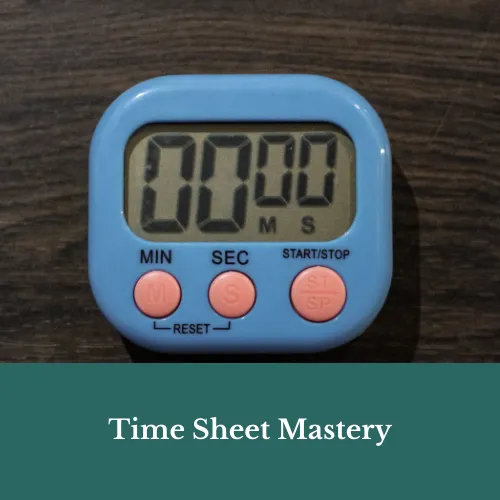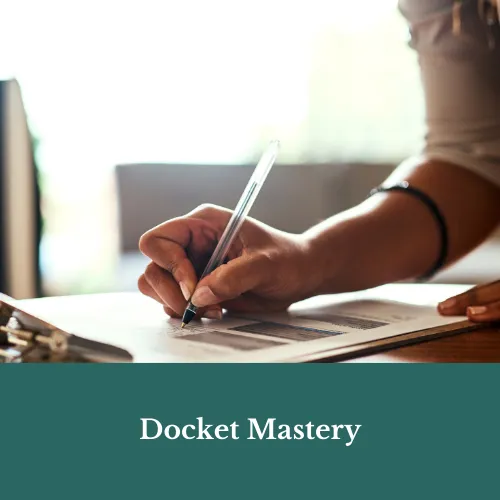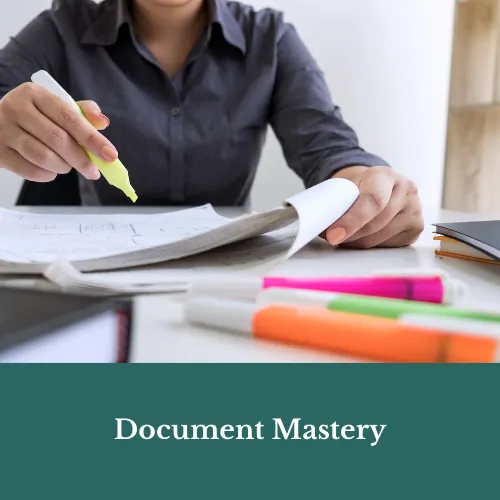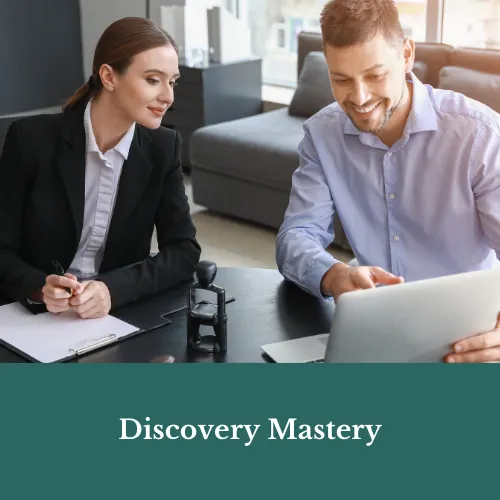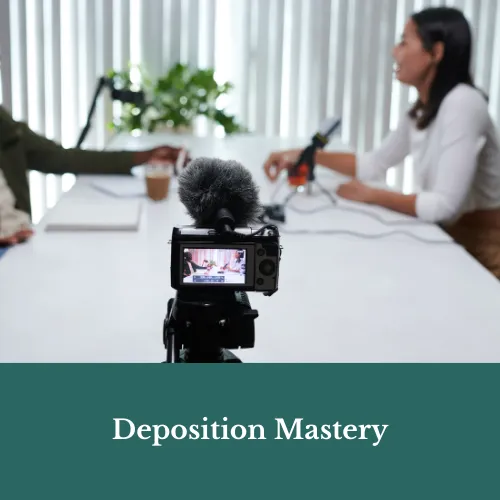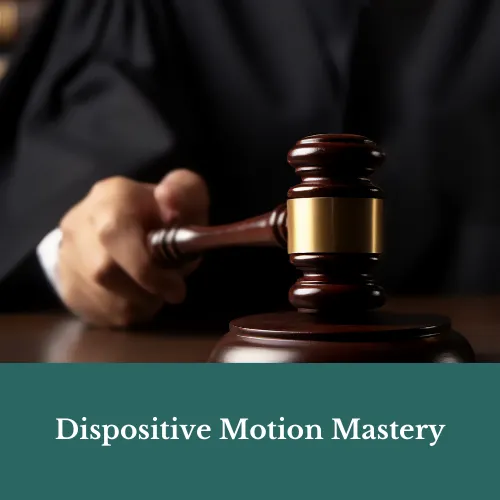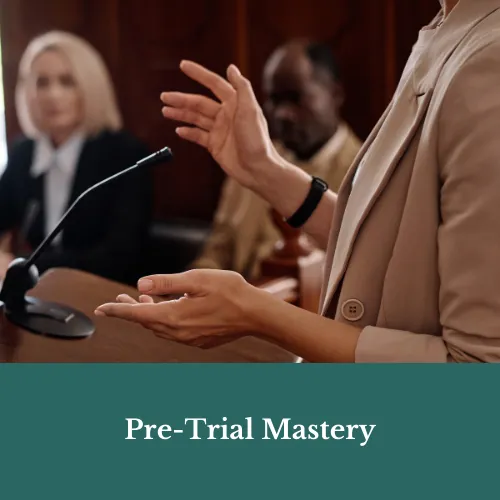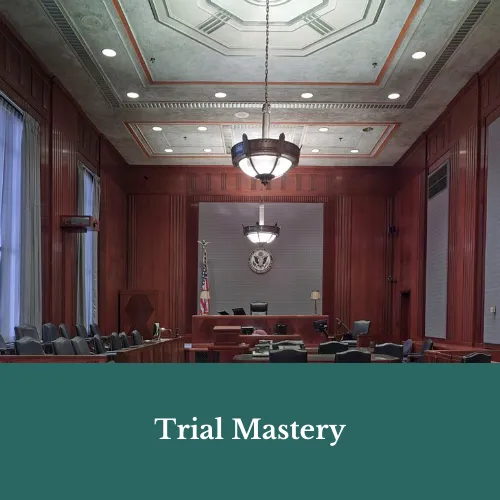Legal Training Courses for New Associates At Every Stage of the Journey
NATmatica offers a library of practical, on-demand legal training courses specifically built for first-year legal associates. From timekeeping to trial preparation, our modules bridge the gap between law school and real-world litigation practice.
Course Library Includes:
On-demand, self-paced attorney training program for first-year law associate skills development.
Our Library of Practical Legal Training Courses for First-Year Associates

Time Sheet Mastery - Write Time Entries Clients Want to Pay For
Learn how to draft accurate, billable time entries. An essential legal skill for first-year associates looking to build efficiency and trust with partners.
In this foundational module of the NATmatica legal training series, new civil litigation associates will learn the essential, real-world skill of timekeeping, a core competency that directly affects billable hours, client trust, and firm revenue.
Designed specifically for first-year associates and recent law school graduates, this course breaks down how to draft accurate, client-friendly time entries in 6-minute increments, whether you're documenting legal research, drafting motions, attending hearings, or communicating with clients.
Through clear frameworks and real examples, you'll learn how to:
Describe your work in language that clients understand and value
Avoid red-flag billing errors that trigger audits or non-payment
Reduce time write-offs by improving clarity and consistency
Capture billable time more completely without working longer hours
Develop daily time entry habits that protect your productivity and personal time
You’ll also learn how strong billing practices impact partner trust, client communication, and your long-term success as an associate.
By the end of this course, you’ll walk away with a streamlined, repeatable timekeeping system and the confidence to bill like a pro from day one.
(90 Minutes)

How to Cultivate Happy Partners and Clients - Build Trust, Deliver Value, and Advance Your Career
In this essential NATmatica module, new associates and junior attorneys will learn how to build strong, trust-based relationships with law firm partners by approaching them the same way they would high-value clients. Designed specifically for first-year associates navigating firm culture, this course teaches the practical skills that make you a go-to member of any litigation team.
You’ll learn how to:
Understand and meet partner expectations with confidence
Communicate proactively to build trust and avoid frustration
Anticipate needs and deliver consistent, high-quality work
Avoid the most common behaviors that frustrate senior attorneys
Foster positive client relationships through a partner-focused mindset
Strengthen internal collaboration and position yourself for long-term growth
This course goes beyond “fitting in.” It teaches you how to stand out. From day-to-day communication to major project execution, you’ll walk away with a partner relationship strategy that sets you apart and directly impacts your billable work, internal reputation, and path to partnership.
By the end of this training, you’ll understand how to become indispensable to your firm and why happy partners lead to more trust, more opportunities, and more advancement.
(90 Minutes)

Managing Your Caseload & Creating Billing Opportunities - Stay Organized and Bill Smarter
In this strategic NATmatica module, first-year associates and junior civil litigators will learn how to efficiently manage multiple cases, meet critical deadlines, and maximize billable time all while establishing themselves as organized, proactive contributors to their law firm.
Tailored for new associate attorneys, this course provides practical training on:
Tracking case progress using visual tools and weekly file reviews
Communicating effectively with partners to manage expectations
Building prioritized task lists aligned with client and firm objectives
Setting and adhering to scheduling orders and internal deadlines
Creating workflows that reduce “fire drills” and improve predictability
Associates will also be introduced to the “life of the case” framework understanding how litigation evolves and identifying billing opportunities at each phase. From drafting early pleadings to preparing for trial, you’ll learn how to anticipate work before it’s assigned, initiate billable tasks, and avoid missed time entries.
This legal training course is packed with real-world strategies to help junior attorneys:
Develop efficient caseload management habits
Capture more billable hours without burnout
Align their work with partner expectations and client needs
Position themselves as future case handlers and partnership-track attorneys
By the end of this module, participants will have a repeatable system for managing their caseload and seizing billing opportunities; skills essential for thriving in a fast-paced litigation practice.
(90 Minutes)

Efficient Docketing and Scheduling Orders - Master the Timelines That Keep Litigation on Track
In this hands-on NATmatica module, new associates will learn the essential docketing and case management skills required to succeed in a litigation practice. Designed for first-year attorneys and junior associates, this course provides a practical roadmap for tracking critical deadlines, preparing scheduling orders, and managing multiple case calendars with confidence and accuracy.
Participants will gain real-world training on:
Best practices for managing docketing systems and litigation timelines
Using legal calendaring tools and docketing software effectively
Tracking court deadlines, filing requirements, and appearances
Prioritizing tasks when facing multiple deadlines across active case
The course also includes step-by-step instruction on how to draft court-compliant scheduling orders—from discovery cutoffs to dispositive motion deadlines. Associates will explore how to balance client strategy with local rules, and how to negotiate reasonable timelines with opposing counsel.
Through practical exercises and examples, associates will:
Build confidence in managing procedural requirements
Learn how to avoid missed deadlines and docketing errors
Understand the strategic role of scheduling in litigation planning
Improve case organization and workflow efficiency
By the end of this course, associates will have the tools to take ownership of docketing and scheduling tasks; skills that are critical to becoming a reliable, detail-oriented litigation associate.
(90 Minutes)

Becoming a Document Master - Efficient Evidence Gathering & Document Review for Civil Litigators
In this pivotal NATmatica module, new associates will gain essential legal skills for managing document-heavy litigation cases. Focused on first-year civil litigation attorneys, this course teaches how to gather evidence from clients efficiently, review large volumes of documents, and prepare accurate, court-compliant mandatory disclosures.
Participants will learn how to:
Organize and streamline the document review process
Identify and prioritize key documents needed to build a strong case
Develop a document management strategy that supports litigation timelines
Store and label evidence in a way that improves accessibility and reduces errors
Supplement disclosures as new information is discovered
This module goes beyond the basics by introducing associates to fact chronologies and evidence mapping, tools that help connect documents to case themes, timelines, and legal arguments.
Associates will engage with:
Practical exercises simulating large-scale document review
Strategies for managing digital files and discovery platforms
Real-world techniques for gathering client records, correspondence, and key exhibits
Best practices for maintaining accurate, evolving mandatory disclosure statements
By the end of this course, junior attorneys will have the confidence and systems to handle complex document review, contribute meaningfully to litigation strategy, and ensure nothing slips through the cracks in high-stakes matters.
(90 Minutes)

Discovery Mastery - Master Written Discovery in Civil Litigation
In this essential NATmatica module, new civil litigation associates will gain hands-on training in the art of written discovery, a cornerstone skill in litigation practice. Designed for junior attorneys and recent law school graduates, this course teaches associates how to draft, serve, and respond to discovery requests with confidence and precision.
Associates will learn how to:
Draft clear and effective interrogatories, requests for production, and requests for admission
Tailor discovery requests to the strategy and needs of each case
Track and organize discovery responses using reliable tools and workflows
Identify deficiencies in opposing responses and follow up with well-crafted correspondence
Understand when and how to escalate discovery disputes strategically
This course emphasizes the importance of beginning the discovery process early and aligning requests with case objectives to maximize the effectiveness of evidence gathering.
Through practical examples, participants will explore how to:
Use the discovery rules to their advantage
Conduct a meaningful review of the opposing party's responses
Strategically pursue information that strengthens claims or defenses
Avoid common mistakes that lead to incomplete or inadmissible evidence
By the end of this module, new associates will be well-equipped to lead the discovery process with purpose and efficiency, making them indispensable assets to any litigation team.
(90 Minutes)

Becoming a Deposition Master - Strategic Preparation for Fact & Expert Witness Depositions
In this focused NATmatica module, new associates will learn how to prepare effectively for fact witness and expert depositions—a core skill in any litigation associate’s toolkit. While this course does not cover how to take a deposition, it dives deep into what associates must know and do before the deposition begins.
Designed for first-year attorneys and junior civil litigators, this training provides a step-by-step framework for:
Organizing deposition materials and exhibits
Creating structured outlines tailored to each witness
Identifying key issues, documents, and themes to cover
Collaborating with partners and subject matter experts
Anticipating objections, defenses, and credibility challenges
Associates will also receive practical answers to the most common early-career questions like:
"Where do I start?"
"What’s the first step when I’m asked to help prepare a deposition?"
This course emphasizes strategic thinking, issue spotting, and systematic preparation—skills that directly improve performance and support case outcomes.
By the end of the module, participants will be able to:
Approach deposition prep with confidence and clarity
Support senior attorneys by being fully prepared and organized
Contribute meaningfully to deposition strategy and execution
Elevate their value on the litigation team through sharp preparation skills
Whether you're preparing for a treating physician, corporate rep, or expert economist, this module will help you build the foundation for becoming an indispensable litigation associate.
(90 Minutes)

Dispositive Motion Mastery - Draft Strong Summary Judgment Motions & Responses with Confidence
In this advanced NATmatica module, first-year associates will learn how to effectively prepare summary judgment motions, statements of fact, and responses, key skills that every civil litigation attorney must master. Tailored for junior lawyers and recent graduates, this course breaks down the often overwhelming process of dispositive motion practice into a structured, repeatable system.
Associates will learn how to:
Build clear, persuasive motions for summary judgment that meet procedural and evidentiary standards
Draft accompanying statements of fact that logically present and support your case theory
Organize supporting exhibits and evidence to comply with court rules
Respond effectively to opposing motions and statements, identifying gaps and inconsistencies
Avoid common pitfalls that weaken dispositive motion arguments
This module emphasizes the critical intersection of legal analysis and evidence organization—two areas where many new litigators struggle.
Through hands-on exercises and step-by-step instruction, associates will gain practical tools to:
Categorize evidence by issue and element
Align facts with legal standards and burden of proof
Draft summaries and responses that are both concise and compelling
By the end of this course, participants will be equipped to support their firm’s litigation strategy by handling dispositive motions with confidence and clarity, demonstrating value as strong legal writers and detail-oriented case builders.
(90 Minutes)

Becoming a Pre-Trial Master - Draft Strategic Pretrial Submissions that Set the Stage for Trial
In this critical NATmatica module, new civil litigation associates will develop the skills necessary to prepare polished, court-ready pretrial submissions, including Joint Pretrial Statements, jury instructions, verdict forms, and exhibit lists. As one of the most high-stakes components of trial preparation, this course teaches first-year attorneys how to organize and deliver pretrial documents that enhance clarity, support strategy, and keep the trial team aligned.
Participants will learn how to:
Compile and draft comprehensive Joint Pretrial Statements that comply with court requirements
Organize trial witness and exhibit lists, including objections from opposing counsel
Prepare neutral case summaries, stipulations, and disputed issue lists
Create trial prep “agendas” for internal coordination among partners and staff
Avoid last-minute fire drills by working ahead of plaintiff drafts and deadlines
This course emphasizes that the Joint Pretrial Statement is the judge’s roadmap and a reflection of the associate’s attention to detail, case knowledge, and strategic foresight.
Through practical frameworks and guided exercises, associates will gain confidence in:
Collaborating with opposing counsel on shared submissions
Managing the timing and structure of pretrial documents
Drafting litigation tools that reduce confusion and expedite evidentiary rulings
By the end of this module, new attorneys will be equipped to take ownership of the pretrial phase with precision, contributing directly to trial readiness and demonstrating real leadership within the litigation team.
(90 Minutes)

Become a Trial Master - Practical Trial Prep Skills for First-Year Litigation Associates
In the final NATmatica module, new civil litigation associates will learn how to prepare for trial with the precision, structure, and confidence of a seasoned litigator. This course goes beyond what’s taught in law school clinics by focusing on the real-world organization and execution required to support a trial team and advocate effectively in court.
Participants will gain hands-on guidance in:
Preparing and organizing exhibits for seamless use during trial
Crafting clear, strategic direct and cross-examination outlines
Managing limited trial time under "shot clock" rules common in many jurisdictions
Sequencing questions to guide testimony logically and persuasively
Connecting witness testimony to exhibits and case themes in real time
This training emphasizes the entire trial preparation process, not just isolated courtroom moments like opening statements. Associates will learn how to:
Associates will learn how to:
Build question outlines that anticipate objections, transitions, and critical evidence
Prepare efficiently for multiple witnesses across several trial days
Maintain flexibility and adjust strategy under pressure during trial presentations
Navigate the courtroom as organized, reliable contributors to the trial team
By the end of this module, participants will have developed a repeatable system for trial preparation that includes time management strategies, exhibit handling, and effective witness examination planning. They’ll walk away with the tools and confidence to support trial attorneys and contribute meaningfully to high-stakes courtroom advocacy.
(90 Minutes)
Full Course List
Time Sheet Mastery
In this foundational module of the NATmatica® training series, new civil litigation associates will gain essential skills for effectively drafting timesheets—a critical aspect of legal practice that directly impacts the firm’s revenue. Recognizing that billing is not merely a routine task but a vital component of client communication, this session will equip participants with strategies to accurately record their work in 6-minute increments. The module aims to demystify the time sheet process, transforming it from a daunting obligation into a streamlined and efficient practice.
Associates will learn to characterize their time entries in a way that not only reflects the complexity and value of their work but also enhances client understanding and satisfaction. This includes practical tips on how to articulate tasks clearly and concisely while emphasizing the significance of each activity performed—whether it’s legal research, drafting documents, or client communications. By taking a proactive approach to time recording, participants will see how well-crafted time entries can reduce the likelihood of billing audits and disputes, ensuring timely payment for services rendered.
Moreover, this module emphasizes the importance of consistency in capturing time daily, helping associates reclaim one of their most valuable resources: personal time. Through interactive exercises and real-world examples, participants will develop a personalized timesheet strategy that fits their workflow and enhances their efficiency. By the end of this course, associates will not only feel confident in their ability to write effective timesheets but also understand the broader impact of their billing practices on client relationships and the firm’s overall success.

How to Cultivate Happy Partners and Clients
In the second module of the NATmatica® training series, associates will learn the art of building strong, productive relationships with partners by treating them as valued clients. This course is designed to help participants understand the dynamics of a law firm environment and what it takes to become an indispensable member of the litigation team. By focusing on the needs and expectations of partners, associates can position themselves for success and create pathways to potential partnership opportunities.
Throughout this module, participants will delve into common pitfalls that can frustrate partners, as well as behaviors that are highly appreciated. Key topics will include effective communication strategies, proactive problem-solving, and understanding the nuances of firm culture. Associates will learn why keeping partners happy is paramount—not just for their own career advancement, but also for fostering a positive work environment that ultimately benefits the entire firm. Additionally, the course will cover the importance of anticipating partner needs, delivering high-quality work, and maintaining a client-focused mindset, which can significantly enhance the firm’s reputation and client relationships.
By the end of this training, participants will have a comprehensive toolkit for navigating the complexities of partner-associate relationships. They will be equipped with practical strategies to manage expectations, provide valuable support, and contribute to the firm’s success. With these insights, associates will be well on their way to establishing themselves as key players in the firm, setting the stage for future partnership opportunities.

Managing Your Caseload and Create Billing Opportunities
In the third module of the NATmatica® training series, participants will learn how to effectively manage their caseload while identifying and capitalizing on billing opportunities. This comprehensive course is designed to equip new civil litigation associates with the tools and strategies necessary to navigate the complexities of multiple cases efficiently. Associates will discover how to anticipate key projects and deadlines that are essential for advancing each file through the litigation process. By mastering time management and organizational techniques, participants will be able to streamline their workflows and ensure that every billable hour is captured.
The module will cover a variety of practical topics aimed at enhancing productivity and efficiency. Associates will learn how to maintain effective communication with partners, utilize visual tools to track progress, and conduct weekly file reviews to stay ahead of deadlines. Additionally, the training will emphasize the importance of creating detailed to-do lists, establishing scheduling orders, and prioritizing tasks based on urgency and client needs. By implementing these strategies, associates will not only enhance their case management skills but also position themselves as proactive contributors to the firm’s success.
Furthermore, this module will introduce participants to the concept of "life of the case," helping them understand the stages of litigation and the associated billing opportunities at each phase. By adopting a proactive mindset and looking ahead to future projects, associates can identify and initiate billable tasks before they become urgent. Through practical exercises and real-life examples, participants will leave this module with a clear plan of action to manage their caseload effectively, ultimately leading to increased billing opportunities and a more fulfilling career in civil litigation

Efficient Docketing and Scheduling Orders
In this module, associates will learn the essential skills required to manage docketing processes and prepare scheduling orders effectively. Docketing is a critical component of civil litigation, as it ensures that all deadlines are met and that the court's schedule is adhered to. This session will cover the best practices for tracking important dates, filing deadlines, and court appearances, as well as utilizing technology and software tools that can streamline the docketing process. Associates will engage in hands-on exercises that simulate real-world scenarios, fostering a deeper understanding of how to prioritize tasks and manage competing deadlines.
Additionally, the module will focus on drafting scheduling orders that align with both client expectations and court requirements. Participants will explore the key elements that should be included in a scheduling order, such as discovery timelines, motion deadlines, and trial dates. Through practical examples and collaborative discussions, associates will gain insight into how to negotiate reasonable timelines with opposing counsel while ensuring compliance with local court rules. By the end of this module, participants will be equipped with the skills needed to efficiently manage their cases' timelines, ultimately enhancing their effectiveness as civil litigation associates at NATmatica.

Becoming a Document Master
In this crucial fifth module of the NATmatica® training series, new civil litigation associates will develop the skills necessary to efficiently gather evidence from clients, review large volumes of documents, and prepare mandatory disclosures. This course is designed to enhance participants' abilities to manage the critical document review process effectively, which is essential for building a strong case. Associates will learn how to establish clear purposes for their review, assess the volume of documents they are dealing with, and determine the most effective methods for storing and organizing these documents.
Throughout the module, participants will explore strategies for identifying all relevant documents and utilizing appropriate tools to execute their review efficiently. The training will emphasize the importance of developing a strategic approach, which includes working on a fact chronology concurrent with the document review process. This helps associates connect the dots between documents and key case facts, ensuring that nothing is overlooked. By the end of the module, associates will be equipped with practical techniques for managing document-intensive cases, including how to effectively supplement mandatory disclosures as new evidence emerges.
Additionally, this module will incorporate hands-on exercises and real-world scenarios that allow participants to apply their learning in a practical context. By mastering the skills of document management and evidence gathering, associates will not only enhance their efficiency and effectiveness in handling cases but will also contribute significantly to their firm’s success. This training will empower them to be proactive in their approach to document review, ultimately strengthening their role as competent and resourceful litigators.

Discovery Mastery
In the sixth module of the NATmatica® training series, new civil litigation associates will gain critical skills in propounding and responding to written discovery requests, including interrogatories, requests for production of documents, and requests for admissions. This module is designed to provide associates with a comprehensive understanding of the discovery process, emphasizing the importance of initiating the process of drafting discovery requests early in a case to maximize evidence gathering and case preparation. Participants will learn effective strategies for drafting clear and concise discovery requests that align with the specific needs of their cases, ensuring that they capture the necessary information from opposing parties.
The training will focus on enhancing core efficiencies throughout the discovery process. Associates will be introduced to tools and methodologies for tracking responses, ensuring they assess each reply for responsiveness and relevance. Furthermore, participants will learn how to draft quality follow-up correspondence to address any deficiencies, effectively teeing up potential discovery disputes when necessary. By understanding when to use interrogatories versus document requests, associates will be better equipped to employ the rules of discovery and disclosure strategically, leading to a more efficient process of evidence gathering from the other side.
Through practical exercises and case studies, this module will enable associates to apply their newfound knowledge in real-world scenarios, reinforcing their ability to navigate the complexities of discovery effectively. By the end of the module, participants will not only feel confident in their ability to manage the discovery process but also understand how to leverage these skills to build stronger cases and enhance their value as litigation professionals.

Deposition Mastery
In the seventh module of the NATmatica® training series, new civil litigation associates will learn the critical skills necessary to prepare effectively for key fact witness and expert depositions. This module focuses not on the act of taking a deposition itself, but rather on the meticulous preparation required to ensure success during the deposition process. Participants will discover efficient strategies for organizing their documents, creating comprehensive outlines, and establishing a systematic approach that enhances both productivity and effectiveness.
The presenter will discuss practical tools designed to address the common questions that arise when the partner first assigns you to help her prepare for a deposition, such as "What now?", "Where do I start?", and "What's the first step?" Participants will learn how to identify and prioritize the key issues to be covered, as well as how to anticipate potential challenges that may arise during the deposition. Emphasis will be placed on critical thinking skills necessary for structuring a deposition outline that facilitates a smooth and effective questioning process.
By the end of this module, participants will be equipped with a clear roadmap for preparing for depositions, enabling them to support their partners and clients confidently. Whether working on fact witness or expert depositions, associates will gain valuable insights into the nuances of deposition preparation, ultimately enhancing their contributions to the litigation team and fostering their development as competent and resourceful litigators.

Dispositive Motion Mastery
In the eighth module of the NATmatica® training series, new civil litigation associates will master the art of preparing summary judgment motions and their accompanying statements of fact, as well as crafting effective responses. Recognizing that the process of preparing these dispositive motions can be daunting due to the intricate rules governing the presentation of facts and evidence, this module aims to streamline that process. Participants will learn to navigate the complexities of summary judgment motions with confidence, ultimately freeing up valuable time to delve into the nuanced legal issues at hand.
The training will focus on the critical skill of organizing evidence effectively to support both motions and responses, a common challenge that often leads to frustration for newer attorneys. Through a structured, step-by-step approach, associates will learn how to gather, categorize, and present evidence in a manner that aligns with court requirements while making a compelling case. This module will also cover best practices for drafting clear and persuasive statements of fact that succinctly encapsulate the evidence. By honing their ability to present information logically and coherently, associates will enhance their chances of success in dispositive motions.
By the end of this module, participants will have developed a comprehensive toolkit for efficiently preparing summary judgment motions and responses. With a firm grasp of the necessary components and a clear methodology for organizing their work, associates will be well-equipped to tackle these critical aspects of civil litigation, ultimately contributing to their growth as skilled advocates and valuable members of their legal teams.

Pre-Trial Mastery
In the ninth module of the NATmatica® training series, new civil litigation associates will gain essential skills for preparing comprehensive pre-trial submissions, including Joint Pretrial Statements, jury instructions, verdict forms, and exhibit lists. This module emphasizes the importance of creating a well-organized Joint Pretrial Statement, which serves as the judge’s “bible” for the case, facilitating informed rulings on evidentiary issues and streamlining trial proceedings. Participants will learn to collaboratively compile a thorough list of trial witnesses and exhibits, along with addressing any objections from the opposing party. Additionally, associates will practice drafting a neutral summary of the case, stipulations agreed upon by both sides, and a concise list of disputed facts and issues.
Understanding that the Joint Pretrial Statement is a significant undertaking, this module encourages associates to start early. By outlining their sections in advance, associates can create an “agenda” for their trial team, ensuring that all necessary components are addressed before deadlines loom. For defense attorneys, the module will highlight the strategic advantage of proactively drafting their sections even before receiving the plaintiff's initial draft. This preparation helps prevent the last-minute “fire drill” that often accompanies pretrial deadlines, allowing associates to take control of the process and improve the overall quality of their submissions.
Associates will leave this module with a clear understanding of how to produce comprehensive and persuasive pretrial submissions, ultimately enhancing their effectiveness in the courtroom and their value as litigation professionals.

Trial Mastery
In the final module of the NATmatica® training series, new civil litigation associates will develop the essential skills needed to prepare effectively for trial. This module focuses on the practical organization required for trial preparation, including the handling of exhibits, crafting direct and cross-examination outlines, and mastering trial time management. Participants will learn how to analyze the testimony required from each witness and how to connect that testimony to the relevant exhibits, ensuring that all critical areas are covered during the trial. By establishing a clear and logical structure for their examination questions, associates will enhance their ability to present a persuasive case.
Additionally, this module addresses the unique challenges posed by time constraints during trials, as many jurisdictions operate under a "shot clock" system that limits the time available for presenting each side's case. Associates will gain valuable insights into how to manage their allotted time effectively, make necessary adjustments on the fly, and maintain an efficient flow of the trial. This training will provide participants with practical strategies for organizing and outlining large volumes of exhibits, ensuring they can readily access and present evidence as needed.
While law school clinics often focus on specific components like opening statements and closing arguments, this module emphasizes the overall process of trial preparation. Participants will learn where to start, how to sequence their questions, and the importance of adapting their strategies based on trial dynamics. By the end of this module, associates will be equipped with the practical skills and tools typically gained through mentorship, empowering them to navigate the complexities of trial with confidence and competence. This comprehensive training will ensure that they are well-prepared to advocate effectively for their clients in the courtroom.

Join The Hive
Join the monthly membership designed to help young associates thrive in the world of practicing law.

Looking for Something More Personalized?
Get immediate feedback, one-on-one mentorship, and support for every step of your journey from a best-in-class lawyer with a heart for mentorship.

Legal Mentorship for Legal Associates: Debora Verdier

The one thing Debora loves more than practicing law?
Mentoring young associates to unlock their potential and help them succeed in an industry where it can be hard to stand out.
Debora Verdier is more than an accomplished lawyer; she’s a mentor to the next generation of legal professionals. With decades of experience as a senior partner, adjunct professor, and award-winning attorney, she understands the challenges new associates face and has crafted the NATmatica series of courses to help you overcome them.
Debora’s innovative approach bridges the gap between law school and practice, turning overwhelmed new legal associates into efficient, confident case handlers who provide value to their firm.
What our students and partners are saying about NATmatica

Debora’s presentation on billing strategies was exceptional. Her emphasis on ethical practices in timekeeping and billing ensured that attendees left with strategies aligned with professional standards. The techniques she shared were not only effective but also immediately actionable, empowering attorneys to capture billable time accurately and efficiently.
Her materials are an invaluable resource for any legal professional.
- Daniel Torrens, Partner

As a first-generation attorney, I had to navigate a learning curve at every stage of my journey. In school, I was fortunate to have access to a wealth of mentors who were eager to guide me. But when I entered law practice, the demands of the profession often left little time for structured guidance. That’s where Debora made all the difference. Her mentorship equipped me with the skills, habits, and independence to tackle significant responsibilities as a junior associate.
Debora’s training fills a critical gap for new attorneys stepping into this challenging profession.
- Chrisanne Gultz, Attorney

As a second-year law student, I truly did not understand the importance of accurate, detailed time entries. Debora's Time Sheet Master presentation not only clarified the why, but also demonstrated the how by providing ample examples to
model. Law students and young associates should really take advantage of this resource —
Skills like these will set them apart from their peers.
- Alyannah Buhman, Law Clerk
Frequently Asked Questions
What’s the best legal training for first-year associates?
The best legal training for first-year associates is one that goes beyond case law and teaches real-world legal skills. NATmatica® is designed specifically for new associates to bridge the gap between law school and actual law firm practice. Our video-based modules teach practical skills—like how to draft time entries, manage caseloads, and work effectively with partners—so new associates can hit the ground running.
How is NATmatica different from CLEs?
Unlike traditional CLEs that focus on legal theory, NATmatica® offers hands-on, practical legal training tailored to junior associates. Instead of passive lectures, our associate training program walks you through the actual tasks you’ll perform at a law firm—timekeeping, litigation prep, file management, client communication, and more. This is real-world legal training for law school graduates and early-career attorneys who want to contribute right away.
Can law firms enroll multiple associates?
NATmatica® was created for new law firm associates, first-year attorneys, and recent law school graduates entering civil litigation. If you're a junior associate looking to improve your efficiency, confidence, and billable hours—or a law firm looking to streamline associate onboarding—this legal training program is built for you.
Can law firms enroll multiple associates?
Absolutely. NATmatica® is ideal for firms looking to implement a consistent, scalable training solution for first-year associates. Check out the NATmatica for firms page to learn more. Our on-demand legal training modules reduce the burden on senior attorneys by teaching foundational skills every new associate needs to be productive, profitable, and client-ready. It's the perfect law firm onboarding program.
Is NATmatica self-paced or scheduled?
All NATmatica® courses are fully self-paced and available on demand. Associates can complete each training module on their own schedule, making it ideal for busy new lawyers balancing multiple deadlines. Whether you're a recent graduate or managing a full caseload at a firm, our flexible format fits seamlessly into your routine.
What topics are covered in the NATmatica legal training series?
The NATmatica® series covers a wide range of practical skills for associate attorneys, including:
Writing billable time entries (Time Sheet Master)
Becoming a valuable member of the litigation team
Caseload management and organization
Written discovery and deposition prep
Trial preparation and strategic planning
Each course is packed with actionable training to help new associates succeed faster.
How does NATmatica help me become a more successful legal associate?
NATmatica® teaches systems, structure, and practical strategies that new lawyers can apply immediately. From time management and document review to litigation planning and communication with partners, this legal training program is built to help you save time, avoid costly mistakes, and increase billable hours—without burning out.
Can I include NATmatica courses on my resume or LinkedIn?
Yes! Completing the NATmatica training series demonstrates your commitment to developing practical legal skills early in your career. Law firms appreciate associates who take initiative and courses like these will set you apart from your peers as someone who’s client-ready and serious about professional growth.

